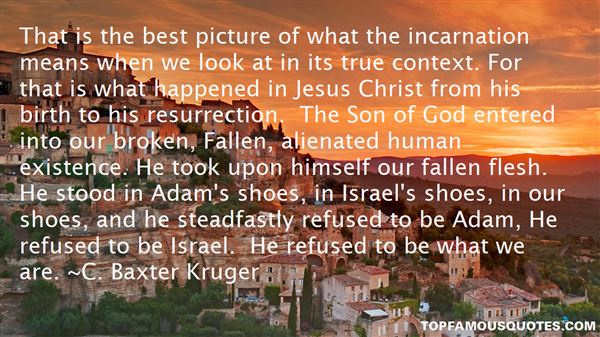
The incarnation is when God became flesh, that God assumed a human nature and became a man in the form ofJesus of Nazareth, the Son of God and the second person of the Trinity.

In the incarnation, the all-powerful, eternal God becomes human, but he doesn't stop being the all-powerful, eternal God. God's self-humiliation in Jesus Christ, also called his kenosis or tapeinosis, does not mean that God is limiting himself or that he has less power. Instead, it means that God used his power in a staggering way within the limits of our temporary existence in space and time. So, it shows that the all-powerful, all-ruling Lord God has the incredible ability to become small and changeable while still being who he has always been and always will be. Here, God's sovereignty is shown to be all-powerful even though it looks small, and it is in this way that God shows and uses his indescribable, incomprehensible power to show and save us in space and time.
There is real change, in the sense that God starts a whole new set of relationships and experiences in Christ. He knows what it's like to have a human body and a human soul. He feels human pain and is tempted by human things. He has to deal with being poor, alone, and put down. He experiences death. He becomes Mary and Joseph's son, James's brother, Peter and John's friend, a neighbor to the people of Nazareth, and the Pharisees' enemy. God knew these things before he became a person because he watched the world around him. But observation, even if it's from the point of view of omniscience, isn't the same as having your own experience. This is what the incarnation gave God: a real, personal taste of what it's like to be a person.
John says that the Word, who was and is God, "became flesh" in a way that is both grand and strange (verse 14). He doesn't say that the Word turned into a person, but that it turned into flesh. "Flesh" means people, but it also means people who are weak. It was a true look at humanity, with real tiredness, hunger, thirst, grief, and pain. So, the eternal and divine Word turned into everything we are and everything we go through in life. In the person of his Word made flesh, God has put himself in the same place as people when they are in the most emotional and physical pain.
Later, when he called himself the "bread of life," Jesus gave his own explanation of what these words meant. At one point, he said, "I am the bread of God. I have come down from heaven" (John 6:33). He also said, "My flesh is the bread that gives life to the world" (speaking of his atoning death, 6:51). In other words, the sufferings of the Word who became flesh didn't just affect his spirit and emotions; they also affected his body and mind.

Our Lord Jesus Christ, as the Son incarnate, reverses the work of the first Adam in his life, death, and resurrection and forges ahead as the last Adam, our great trailblazer and champion (Heb. 2:10). God the Son becomes perfectly qualified to meet our every need as a result of the incarnation, especially our need for sin forgiveness.
We are joined to Christ because he is joined to us. Because he made himself one with us, we can be one with him. It's always God who takes the first step.

Bible Tag Prompt
As you ponder the amazing Incarnation this week stitch and pray to be aware of the beautiful union we have though Christ. Include a chain stitch.












